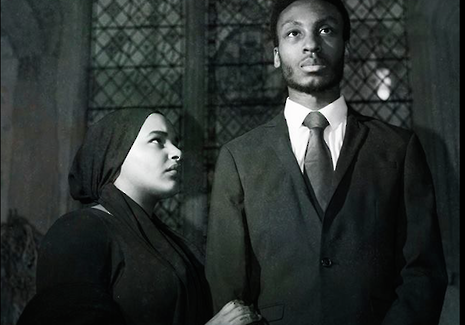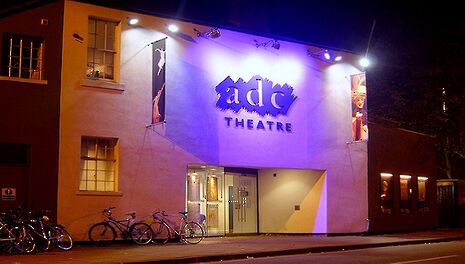Race representation doesn’t end at Macbeth. All students need to take action.
In the final instalment of her articles on BME opportunities in Cambridge student theatre, Naomi Obeng speaks to Saskia Ross and ends not on hope, but on an imperative rallying cry

“Auditions have always been a really difficult experience as a woman of colour in Cambridge, especially as someone who doesn't come from a very theatrical background.” Saskia Ross, director of this term’s BME production of Macbeth, tells me. “It's tough getting rejected because you never know if you're not good enough or because you don't look the part – and it's very, very easy not to look the part as a somewhat androgynous black woman.” We’ve arrived at the final instalment of my examination of the various issues that feed into Cambridge’s problem with race representation on stage.
“The biggest and best shows, are white. It sucks”
The plays that are put on, the legacy of the ‘greats’ and the short collective memory of a cohort, all contribute to a general disengagement among students of colour. “It's also tough when you get roles,” Saskia reflects, “because what if you're just filling a quota, inserted into a play to fill the role of Other? It's exhausting. Especially when most of the people you see on stage, on the biggest and best shows, are white. It sucks, it has been discouraging.” Those involved in Cambridge theatre who are not BME students (and I do hope that you’re reading!) might want to take note that the scene they experience as supportive, sustaining and full of opportunity is simultaneously discouraging and exhausting to many (if not most) students of colour.

Recently though, things have been improving. A new BME theatre group has provided an encouraging atmosphere where race isn’t a question mark overhanging every audition or play application, and the BME oriented plays over this academic year have been overwhelmingly positive experiences for those involved. For Macbeth, Saskia auditioned many students who’d been encouraged to get involved in theatre for the first time. “I think it's really important to create a safe space where people of colour don't have to face the competitive turmoil of the rest of Cambridge theatre.”
So how can we make sure that this positive progress continues, and extends across all of Cambridge Theatre? Well, it’s worth understanding how CUADC, for instance, actually works to know what can change. I often wondered whether making money is a big obstacle to change, so I asked Sheanna Patelmaster, outgoing CUADC president, how it all works. The CUADC/ADC shows are selected termly, and funded with the aim of breaking even.
Well-known shows are generally expected to bring in more money, and these are balanced with more experimental shows, although sometimes it can work the other way round. Selection is done by the CUADC student committee and ADC management, who oversee the practical running and money-making side of the theatre. Overseeing all of this is the Executive Committee, to whom show selection must be justified each term.
“At the time of writing no one has yet applied with a play by a BME writer”
She stresses to me that CUADC is lucky in that it can afford to make losses and take risks on shows, as opposed to college societies with less money to spare. The lack of BME representation in CUADC programs is a problem that Sheanna is well aware of and she has done her bit to tackle it by championing Teahouse, and introducing a category specifically for plays by a BME author in the termly applications. This means that if they receive a good application for a show in this category, then CUADC will program it, removing the competitiveness of being lumped in with all the other applications.
The problem is, though, that at the time of writing no one has yet applied with a play by a BME writer. I suspect this was partly down to the category scheme not being well advertised, but this type of structural encouragement is absolutely necessary and needs to continue.
The content of the plays is only part of the problem though. Reassessing what we want Cambridge Theatre to be is also well overdue. Innovating? Inventive? Boundary-breaking? Personal? Training for acting beyond the bubble? Affecting? Maybe if people were no longer plied with Camdram credits as though Cambridge theatre were a currency and a badge, rather than an opportunity to bring minds together to make art, everyone might feel more responsible for the atmosphere that’s created. I do hope things will continue to move forward and that changes will last. But it’d be weak of me, knowing the multitude of problems, to end my series on a hope.
Clearly actions can be taken, and they should be.
Start by putting on plays that you’ve never seen before, and when you audition people, encourage BME actors in your call, explicitly. You want to pick from the best people, so make sure that truly means everyone.
If you’re thinking of directing yet another Tennessee Williams (or the like), and think there’s no reason why fantastic BME actors might give this a pass, think again. Listen to the people around you and the world beyond you, and tell those stories.
If you’re involved in CUMTS, know that many singing and dancing BME students are completely alienated by you above all. I don’t have a solution for this, but you must find one.
If you’re a student of colour wanting to be involved in Cambridge theatre know that you can continue to make your own rules. Keep the BME theatre group going, use the BME author ADC show category if that’s what you want to see.
As in so many areas, here too Cambridge needs desperately to look to the future, because what is already on stage largely determines what people will apply to put on.
So finally, to those sitting on committees, consider that exhortation for something new will not help if you’re not already making those shows happen. Start by actively inviting a diverse group in: that’s far more effective than leaving your door ajar and just hoping they’ll visit you
 News / Reform candidate retracts claim of being Cambridge alum 26 January 2026
News / Reform candidate retracts claim of being Cambridge alum 26 January 2026 Interviews / Lord Leggatt on becoming a Supreme Court Justice21 January 2026
Interviews / Lord Leggatt on becoming a Supreme Court Justice21 January 2026 News / Report suggests Cambridge the hardest place to get a first in the country23 January 2026
News / Report suggests Cambridge the hardest place to get a first in the country23 January 2026 Comment / How Cambridge Made Me Lose My Faith26 January 2026
Comment / How Cambridge Made Me Lose My Faith26 January 2026 Features / Are you more yourself at Cambridge or away from it? 27 January 2026
Features / Are you more yourself at Cambridge or away from it? 27 January 2026








